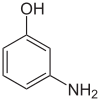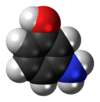3-Aminophenol
| |||
| Names | |||
|---|---|---|---|
| IUPAC name
3-Aminophenol | |||
| Other names
m-Aminophenol; 3-Hydroxyaniline; m-Hydroxyaniline | |||
| Identifiers | |||
| 591-27-5 | |||
| ChEBI | CHEBI:28924 | ||
| ChEMBL | ChEMBL269755 ChEMBL376136 | ||
| ChemSpider | 11080 | ||
| EC number | 209-711-2 | ||
| |||
| Jmol-3D images | Image | ||
| KEGG | C05058 | ||
| PubChem | 11568 | ||
| |||
| UNII | L3WTS6QT82 | ||
| Properties | |||
| C6H7NO | |||
| Molar mass | 109.13 g/mol | ||
| Appearance | White orthorhombic crystals | ||
| Density | 1.195 g/cm3 | ||
| Melting point | 120 to 124 °C (248 to 255 °F; 393 to 397 K) | ||
| Boiling point | 164 °C (327 °F; 437 K) at 11 mmHg | ||
| Hazards | |||
| R-phrases | R20/22 R51/53 | ||
| S-phrases | S28 S61 | ||
| Except where noted otherwise, data is given for materials in their standard state (at 25 °C (77 °F), 100 kPa) | |||
| | |||
| Infobox references | |||
3-Aminophenol is an organic compound with formula C6H4(NH2)(OH). It is an aromatic amine and aromatic alcohol. It is the meta isomer of 2-aminophenol and 4-aminophenol.
Preparation
3-Aminophenol can be prepared by caustic fusion of 3-aminobenzenesulfonic acid (i.e. heating with NaOH to 245°C for 6 hours)[2] or from resorcinol via a substitution reaction with ammonium hydroxide.[3]
Uses
One of the most relevant applications of the substance is the synthesis of 3-(diethylamino)phenol, key intermediate for the preparation of several fluorescent dyes (e.g., Rhodamine B). Other uses for the compound include hair dye colorants and stabilizers for chlorine-containing thermoplastics.[2]
References
- ↑ 3-Aminophenol at Sigma-Aldrich.
- ↑ 2.0 2.1 Mitchell, Stephen C.; Waring, Rosemary H. (2000). "Aminophenols". Ullmann's Encyclopedia of Industrial Chemistry. doi:10.1002/14356007.a02_099.
- ↑ Harada, Haruhisa; Hiroshi, Maki; Sasaki, Shigeru (1986). "Method for the production of m-aminophenol EP0197633A1". Google Patents. Sumitomo Chemical Company, Limited. Retrieved 3 February 2015.

